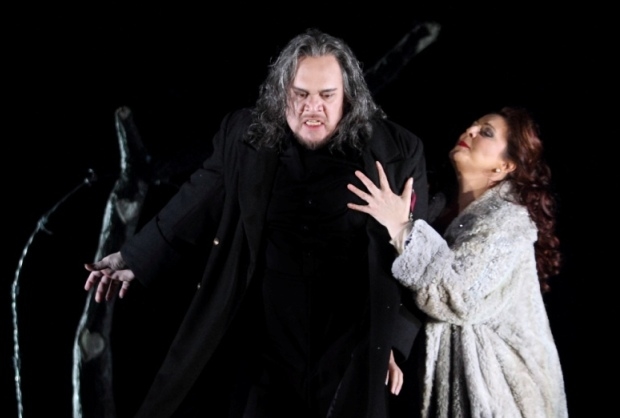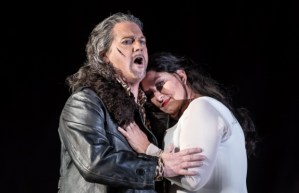Review: Il trovatore (Royal Opera House)
A rapid return for Covent Garden’s 2016 staging of Verdi’s popular opera

© Catherine Ashmore
You wait years for a Royal Opera Trovatore and then two—no, four—come along at once. A double debut last June and July has been swiftly followed by a pair of revivals, separately cast like their predecessors, one now and one in late January. But I'm not convinced that David Bösch's flat production deserves such exposure.
It's literally flat, in that Patrick Bannwart's designs are rooted to the stage floor with no attempt to add interest through the use of gradients or levels, while as a visual experience it has the kind of flatness that betrays a director bereft of inspiration.
The scenic emptiness bothered me even more on second viewing than it did first time round. Imagine War Horse minus the puppets, the revolve and the know-how, and you're almost there. Bösch's drab stage suggests rather than depicts a 20th-century battle ground, a monochrome wasteland of denuded trees and razor wire. On the other hand it has a decent dramatic pulse and a narrative clarity that was missing from the company's other recent Verdi outings like Nabucco and Un ballo in maschera.
Il trovatore is notorious for having a back story that's more interesting than the main plot. The bare bones are these. Long ago, the gypsy woman Azacuna (Anita Rachvelishvili) inadvertently threw the wrong baby onto a bonfire, killing her own child rather than the noble brother of the Conte di Luna (Quinn Kelsey) whom she was trying to destroy. Instead, she raises the accidental survivor as her own child, Manrico. Fast forward to the opera, and enter the luckless Leonora (Maria Agresta), who loves Manrico but is desired by his unknowing brother. A love triangle with a twist, then. It'll all end in flames.
The cast this time is notably stronger than the one I saw last July (having missed the June version). Rachvelishvili is less animalistic and more tragic than her predecessor, Agresta is a vocally resplendent Leonora, vulnerable and touching in her great aria, "Tu vedrai che amore", with Jennifer Davis an ideal foil as her confidante. Ines. Kelsey, meanwhile, is a proper Verdi baritone, burnished and agonised as the notional villain of the piece.
Roberto Alagna's late cancellation has opened the way for the Uzbekistani tenor Najmiddin Mavlyanov to lead the opera as Manrico, and he gives a safe if uninspiring performance. He's no great actor (those tell-tale dangling arms) and the voice lacks finesse, but it's the devil of a role to take on at short notice. More notable is the Hungarian bass Gábor Bretz as Ferrando, di Luna's military captain. He opens the show with an assertive flourish and his appearances thereafter invariably lift the energy levels.
The undoubted star of these revivals is Richard Farnes, late of Opera North and now a treasurable freelance conductor. His Verdi, like his Wagner, is electric, and the ROH Orchestra responds to him with the kind of verve it usually reserves for the boss, Antonio Pappano. The ROH Chorus, too, is on fine form, despite some silly brandishing of Big Nasty Knives.
It may look drab, but Il trovatore sounds golden. All that's missing is a bamboo horse.
Il trovatore runs in repertory at the Royal Opera House until 16 December. It returns for six further performances, again conducted by Richard Farnes but with a different company of singers, on 26 January.













